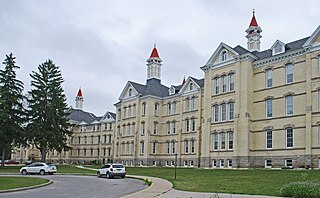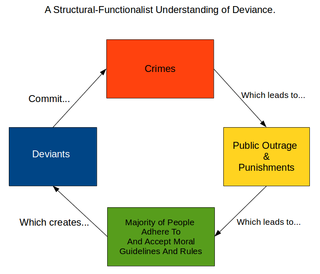
A mental disorder, also called a mental illness or psychiatric disorder, is a behavioral or mental pattern that causes significant distress or impairment of personal functioning. Such features may be persistent, relapsing and remitting, or occur as a single episode. Many disorders have been described, with signs and symptoms that vary widely between specific disorders. Such disorders may be diagnosed by a mental health professional.

Psychiatric hospitals, also known as mental health hospitals, and mental health units, are hospitals or wards specializing in the treatment of serious mental disorders, such as major depressive disorder, schizophrenia and bipolar disorder. Psychiatric hospitals vary widely in their size and grading. Some hospitals may specialize only in short term or outpatient therapy for low-risk patients. Others may specialize in the temporary or permanent care of residents who, as a result of a psychological disorder, require routine assistance, treatment, or a specialized and controlled environment. Patients are often admitted on a voluntary basis, but people whom psychiatrists believe may pose a significant danger to themselves or others may be subject to involuntary commitment and involuntary treatment. Psychiatric hospitals may also be referred to as psychiatric wards or units when they are a subunit of a regular hospital.

Social work is an academic discipline and practice-based profession that concerns itself with individuals, families, groups, communities and society as a whole in an effort to meet basic needs and enhance social functioning, self-determination, collective responsibility, and overall well-being. Social functioning is defined as the ability of an individual to perform their social roles within their own self, their immediate social environment, and the society at large. Social work applies social sciences, such as sociology, psychology, political science, public health, community development, law, and economics, to engage with client systems, conduct assessments, and develop interventions to solve social and personal problems; and to bring about social change. Social work practice is often divided into micro-work, which involves working directly with individuals or small groups; and macro-work, which involves working with communities, and – within social policy – fostering change on a larger scale.

Forensic psychiatry is a subspeciality of psychiatry and is related to criminology. It encompasses the interface between law and psychiatry. According to the American Academy of Psychiatry and the Law, it is defined as "a subspecialty of psychiatry in which scientific and clinical expertise is applied in legal contexts involving civil, criminal, correctional, regulatory, or legislative matters, and in specialized clinical consultations in areas such as risk assessment or employment." A forensic psychiatrist provides services – such as determination of competency to stand trial – to a court of law to facilitate the adjudicative process and provide treatment, such as medications and psychotherapy, to criminals.

The Institute of Mental Health is a psychiatric hospital in Singapore. In 2006, the Institute of Mental Health compound was marked as Singapore's 83rd historic site by the National Heritage Board due to its history as Singapore's first mental institution. The IMH is sometimes referred to as "Woodbridge" by locals.
Psychiatric nursing or mental health nursing is the appointed position of a nurse that specialises in mental health, and cares for people of all ages experiencing mental illnesses or distress. These include: schizophrenia, schizoaffective disorder, mood disorders, anxiety disorders, personality disorders, eating disorders, suicidal thoughts, psychosis, paranoia, and self-harm.

Deinstitutionalisation is the process of replacing long-stay psychiatric hospitals with less isolated community mental health services for those diagnosed with a mental disorder or developmental disability. In the late 20th century, it led to the closure of many psychiatric hospitals, as patients were increasingly cared for at home, in halfway houses and clinics, in regular hospitals, or not at all.

Psychiatric and mental health nurses in the U.S. Army Nurse Corps employing groundbreaking protocols and treatments in psychiatric issues to address the unique challenges that our service men and women face, more commonly post-traumatic stress disorder and traumatic brain injuries. Most people understand that trauma exposure is a popular occupational hazard for military members. Psychiatric screenings, before and during their enlistment, and treatments after being exposed to warfare, death, destruction, and torture have been extremely beneficial for military personnel and their dependents.
A mental health professional is a health care practitioner or social and human services provider who offers services for the purpose of improving an individual's mental health or to treat mental disorders. This broad category was developed as a name for community personnel who worked in the new community mental health agencies begun in the 1970s to assist individuals moving from state hospitals, to prevent admissions, and to provide support in homes, jobs, education, and community. These individuals were the forefront brigade to develop the community programs, which today may be referred to by names such as supported housing, psychiatric rehabilitation, supported or transitional employment, sheltered workshops, supported education, daily living skills, affirmative industries, dual diagnosis treatment, individual and family psychoeducation, adult day care, foster care, family services and mental health counseling.
Assertive community treatment (ACT) is an intensive and highly integrated approach for community mental health service delivery. ACT teams serve individuals with the most serious forms of mental illness, predominantly but not exclusively the schizophrenia spectrum disorders. ACT service recipients may also have diagnostic profiles that include features typically found in other DSM-5 categories. Many have histories of substance abuse, victimization and trauma, psychiatric hospitalization, arrests and incarceration, homelessness, and additional significant challenges. The symptoms and complications of their mental illnesses have led to serious functioning difficulties in several areas of life, often including work, social relationships, residential independence, money management, and physical health and wellness. By the time they start receiving ACT services, they are likely to have experienced failure, discrimination, and stigmatization, and their hope for the future is likely to be quite low.
The psychiatric survivors movement is a diverse association of individuals who either currently access mental health services, or who are survivors of interventions by psychiatry, or who are ex-patients of mental health services.
Psychiatric rehabilitation, also known as psych social rehabilitation, and sometimes simplified to psych rehab by providers, is the process of restoration of community functioning and well-being of an individual diagnosed in mental health or emotional disorder and who may be considered to have a psychiatric disability.

A registered psychiatric nurse (RPN) specialises in a field of nursing that focuses on the mental health of patients. Psychiatric nurses assist the interdisciplinary team in the treatment of the patient's psychiatric illness and symptoms. They treat a variety of mental health disorders such as bipolar, depression, schizophrenia, anxiety, substance abuse addiction and eating disorders such as bulimia and anorexia. However, they do not diagnose the patient, this is the responsibility of a qualified psychologist or a psychiatric doctor. Psychiatric nurses are in charge of dispensing medication and the overall care of patients. Registered psychiatric nurses work under the supervision of doctors’ and they practice within the health care industry, mostly in mental health clinics, outpatient facilities, mental health agencies, long-term care centres or hospitals.
A Crisis Intervention Team (CIT) is a police mental health collaborative program found in North America. The term "CIT" is often used to describe both a program and a training in law enforcement to help guide interactions between law enforcement and those living with a mental illness.
A psychiatric assessment, or psychological screening, is the process of gathering information about a person within a psychiatric service, with the purpose of making a diagnosis. The assessment is usually the first stage of a treatment process, but psychiatric assessments may also be used for various legal purposes. The assessment includes social and biographical information, direct observations, and data from specific psychological tests. It is typically carried out by a psychiatrist, but it can be a multi-disciplinary process involving nurses, psychologists, occupational therapist, social workers, and licensed professional counselors.
Center for Mental Health Services (CMHS), also known as community mental health teams (CMHT) in the United Kingdom, support or treat people with mental disorders in a domiciliary setting, instead of a psychiatric hospital (asylum). The array of community mental health services vary depending on the country in which the services are provided. It refers to a system of care in which the patient's community, not a specific facility such as a hospital, is the primary provider of care for people with a mental illness. The goal of community mental health services often includes much more than simply providing outpatient psychiatric treatment.
Psychiatry is the medical specialty devoted to the diagnosis, prevention, and treatment of mental disorders. These include various maladaptations related to mood, behaviour, cognition, and perceptions. See glossary of psychiatry.
Services for mental health disorders provide treatment, support, or advocacy to people who have psychiatric illnesses. These may include medical, behavioral, social, and legal services.
Unlicensed assistive personnel (UAP) are paraprofessionals who assist individuals with physical disabilities, mental impairments, and other health care needs with their activities of daily living (ADLs). UAPs also provide bedside care—including basic nursing procedures—all under the supervision of a registered nurse, licensed practical nurse or other health care professional. UAPs must demonstrate their ability and competence before gaining any expanded responsibilities in a clinical setting. While providing this care, UAPs offer compassion and patience and are part of the patient's healthcare support system. Communication between UAPs and registered nurses (RNs) is key as they are working together in their patients' best interests. The scope of care UAPs are responsible for is delegated by RNs or other clinical licensed professionals.
A Mental Health Nurse (MHN) refers to a psychiatric nurse in the UK, who specialises in the care of patients with mental health issues.